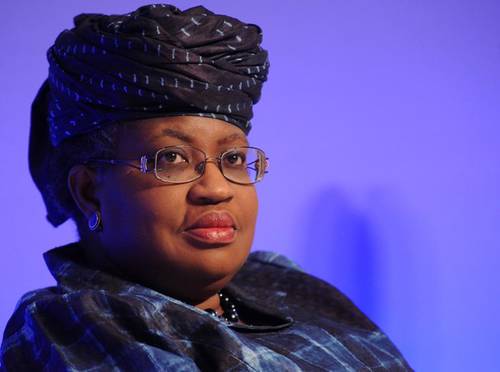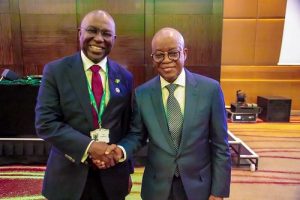Nigeria, Others Cautioned Against Import Restrictions on Food

*It will worsen inflation, says WTO DG
*Tasks Nigeria on deposit instrument of acceptance on fisheries agreements
By Our Correspondent
Nigeria and other members of the World Trade Organisation (WTO) have been cautioned against import restriction policies on food.
The Director General of WTO, Dr. Ngozi Okonjo-Iweala who gave this warning said such policies were capable of worsening inflation on food items.
Okonjo Iweala who spoke on Tuesday during a courtesy visit to the Ministry of Industry, Trade and Investment advised member states to respect some of the rules on import and export restrictions and make them transparent.
She said that even when such restrictions were in place, they have to be limited in duration.
She said that the cause of food prices rising so much higher was as a result of import and export restrictions.
Okonjo Iweala while noting that her organization does not finance agriculture, added however that it ensures that member countries allow free flow of trade in food and agricultural products .
She called on the federal government to expedite action on the need to deposit the instrument of acceptance on fisheries agreements negotiated earlier with the Minister of State for Industry, Trade and Investment, Mrs. Maryam Katagum as the head of the Nigerian delegation who also pressed for reforms in the fisheries sector.
According to her, Nigeria needs to ensure deposit of Instrument of Acceptance, especially on the legal framework, as required by member countries.
She said, “It needs not to take time and that is what I am here to urge that this be done quickly and we are trying to urge all the countries to do it because we need two-thirds of countries to deposit their instruments of acceptance for the agreement to come into effect.
“If it (new fisheries agreement) comes into effect, it means that when you catch people doing unreported and unregulated fishing, they can be held accountable.
“WTO has a dispute settlement system and that’s what many members don’t want to be brought there for not obeying the rules. So that’s deterrence and it’s only one of its kinds that exist in the world.
“We are trying to reform it but it is in existence – and countries don’t want to be brought there by other countries.
“From what I understand, the work and thinking on how to deposit the instrument have already begun and so I am very happy about that.”
*Tasks Nigeria on deposit instrument of acceptance on fisheries agreements
By Our Correspondent
Nigeria and other members of the World Trade Organisation (WTO) have been cautioned against import restriction policies on food.
The Director General of WTO, Dr. Ngozi Okonjo-Iweala who gave this warning said such policies were capable of worsening inflation on food items.
Okonjo Iweala who spoke on Tuesday during a courtesy visit to the Ministry of Industry, Trade and Investment advised member states to respect some of the rules on import and export restrictions and make them transparent.
She said that even when such restrictions were in place, they have to be limited in duration.
She said that the cause of food prices rising so much higher was as a result of import and export restrictions.
Okonjo Iweala while noting that her organization does not finance agriculture, added however that it ensures that member countries allow free flow of trade in food and agricultural products .
She called on the federal government to expedite action on the need to deposit the instrument of acceptance on fisheries agreements negotiated earlier with the Minister of State for Industry, Trade and Investment, Mrs. Maryam Katagum as the head of the Nigerian delegation who also pressed for reforms in the fisheries sector.
According to her, Nigeria needs to ensure deposit of Instrument of Acceptance, especially on the legal framework, as required by member countries.
She said, “It needs not to take time and that is what I am here to urge that this be done quickly and we are trying to urge all the countries to do it because we need two-thirds of countries to deposit their instruments of acceptance for the agreement to come into effect.
“If it (new fisheries agreement) comes into effect, it means that when you catch people doing unreported and unregulated fishing, they can be held accountable.
“WTO has a dispute settlement system and that’s what many members don’t want to be brought there for not obeying the rules. So that’s deterrence and it’s only one of its kinds that exist in the world.
“We are trying to reform it but it is in existence – and countries don’t want to be brought there by other countries.
“From what I understand, the work and thinking on how to deposit the instrument have already begun and so I am very happy about that.”





